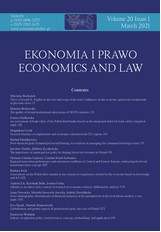Knowledge flows in contemporary economies: expectations and the European Union results
Knowledge flows in contemporary economies: expectations and the European Union results
Author(s): Aleksandra PleśniarskaSubject(s): Evaluation research, Economic development, EU-Accession / EU-DEvelopment
Published by: Wydawnictwo Naukowe Uniwersytetu Mikołaja Kopernika
Keywords: knowledge transfer; international transfer of knowledge; European Union; open science; international scientific cooperation;
Summary/Abstract: Access to knowledge and the ability to absorb it are increasingly becoming the decisive factor in the level of development and the pace of economic growth. Knowledge transfer is a complex process that can have both an internal dimension (between entities within a given country) and an international one (between domestic and foreign entities). In this context, knowledge flows in the area of science and innovation deserve special attention. Aim: The main purpose of the article is to present the multidimensional nature of knowledge flows and to identify the position of the EU in comparison with global competitors in this filed, especially considering the global science and innovation context. What are the channels of knowledge flow? To what extent does the EU participate in the international knowledge flows? What are the EU expectations in this area? This article endeavours to answer the questions above. Results: The article systematizes information on knowledge flows in economy and supplements it with a comparative analysis, which allows for better understanding of the international position of the European Union in this field. The conclusion states that despite lagging behind the United States, European science is becoming increasingly more open-access oriented and the EU is still among the leaders of international scientific cooperation.
Journal: Ekonomia i Prawo. Economics and Law
- Issue Year: 19/2020
- Issue No: 4
- Page Range: 773-787
- Page Count: 16
- Language: English

